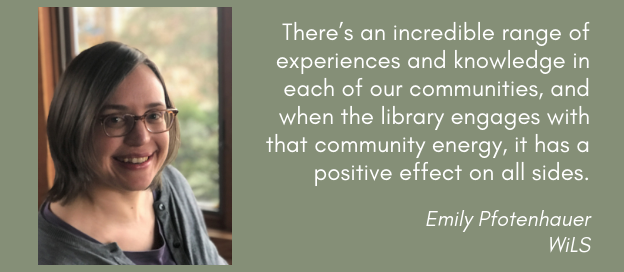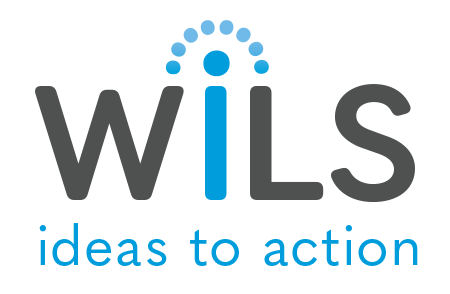
You may have noticed that WiLS has some new faces among its staff. We are excited to grow our skills and improve our services by bringing new members into our team while also leveraging the experience and strengths that our existing team contributes. In the coming months, we will be sharing a little more about WiLS staff members, both new and experienced, in their own words.
This month, we talk with Emily Pfotenhauer, Program Manager for Recollection Wisconsin.
Tell us a little bit about yourself.
I’ve lived in Wisconsin pretty much my whole life — a mentor of mine, Jon Prown, once described me as “a dedicated daughter of Wisconsin.” I was born in Green Bay, grew up in Mineral Point, and went to school in Madison. I just did the math and realized I’ve lived in Madison for close to 20 years!
My husband and I have a 5-year-old daughter who loves superheroes and dinosaurs and is very excited to start kindergarten this fall.
What do you do in your role at WiLS?
I lead WiLS’ Digital Projects Team, which includes managing the Recollection Wisconsin digital collections consortium and the consortium’s grant-funded projects, Curating Community Digital Collections and Listening to War, plus other digital archives projects like Mukurtu. I’m also part of the new-ish Strategy Group at WiLS, which has been a great learning experience for me to get a bird’s eye view of all the different work WiLS does and how it all fits together.
Why did you make the decision to do this job?
I kind of slid into it sideways, to be honest. I went to graduate school for art history and intended to work in museums. (My big open secret is that I don’t have an MLIS!) After grad school, I was working on a research project, supported by the Chipstone Foundation, that involved building a digital collection of material culture artifacts — the Wisconsin Decorative Arts Database. I visited local historical societies and historic house museums all over the state and built a lot of relationships with these small and rural institutions. I came on board with WiLS and Recollection Wisconsin in 2009, when the program was called Wisconsin Heritage Online. They were looking for an Outreach Specialist who could support digital collections from smaller organizations, and I fit the bill.
If money or capacity were no concern, what WiLS service would you implement or expand?
A digital preservation system. Libraries, archives, museums, and historical societies are all creating huge amounts of digital content — digitized materials as well as “born-digital” stuff like video oral history interviews, social media feeds, web sites — and all of this digital content has to be safely stored and managed so it doesn’t disappear.
What are you listening to or watching or reading right now that’s making you think?
My main reading material is always the New Yorker and I am perpetually working my way through a stack of back issues. One of the best things I’ve read in there recently was “The Secrets of Lyndon Johnson’s Archives” by Robert Caro. It’s his personal story of researching the life of LBJ, which basically involved relocating to rural Texas for several years. Some of it is problematic — his wife, Ina, is basically his unpaid, uncredited research assistant, and he’s overly concerned with the importance of physical archives vs. digital reproductions. But it’s a really cool demonstration of how archival bits and pieces can add up to a much bigger story.
What do you see as a significant opportunity for our members in the next ten years?
Our greatest opportunity is proactive community engagement, especially with diverse and underrepresented populations. There’s an incredible range of experiences and knowledge in each of our communities, and when the library engages with that community energy, it has a positive effect on all sides.
